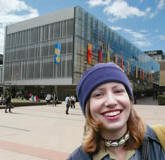STUDY HEALTH, SEXUALITY & CULTURE AT UNIVERSITY OF NEW SOUTH WALES AUSTRALIA
The University of New South Wales is one of Australia's leading universities. Established in 1949, UNSW is a member of the Group of Eight (Go8) key teaching and research universities in Australia and a founding member of Universitas 21, a consortium of the world's leading research universities from Asia, Europe and North America.
UNSW is Australia's most internationalised university with students representing 130 countries. The main campus is located in the Sydney suburb of Kensington approximately 10 kilometres from the central business district and is conveniently linked to all major city transport hubs.
The research program in Health, Sexuality and Culture is housed at the National Centre in HIV Social Research. It is one of the only programs of its kind in the world, offering a dynamic mix of empirical and applied research and contemporary social and critical theory.
WHO WE ARE
The National Centre in HIV Social Research (NCHSR) was established in 1990 with funding from the Commonwealth government of Australia. NCHSR is internationally recognised for its contribution to social understandings of the HIV epidemic among gay men, with a growing body of work on drug use, gender, and medical technologies.
In 2003, as part of a Consortium for Social and Policy Research in HIV, Hepatitis C and Related Diseases, NCHSR gained funding from NSW Health to expand its graduate program in Health, Sexuality and Culture. NCHSR works with a range of partners through the Consortium, including:
" The Social Policy Research Centre
" ACON (The AIDS Council of New South Wales)
" The Hepatitis C Council of NSW
" People Living with HIV and AIDS, NSW
" National Users Association of Australia
" NSW Health
NCHSR also works with a range of other partners in research and practice.
The NCHSR is committed to the involvement of affected communities in its research. This ensures relevant research as well as an effective interface with those members of the partnership engaged in program development and delivery.
NCHSR academic staff come from a wide range of disciplinary backgrounds, with expertise in sociology, psychology, anthropology, gender studies, public health, science studies, linguistics, education, history, social work, librarianship, statistics and cultural studies represented at the Centre. While the core work of NCHSR has to do with HIV and Hepatitis C, we welcome postgraduate proposals on any aspects of the social study of sex or drugs, including issues of gender, embodiment, medicine, technology, culture and globalisation.
WHAT IS UNIQUE ABOUT THIS RESEARCH PROGRAM
This interdisciplinary research program allows students from the social sciences, humanities, and health sector to undertake a research Masters or PhD in Health, Sexuality and Culture. The program is co-ordinated through the Faculty of Arts and Social Sciences, and is guided by a social paradigm that understands persons and communities as social beings. Much of the research at the centre is oriented to the needs of practitioners working in the policy field. There is also the scope to conduct more conceptual and theoretical inquiry into questions of bodily and erotic practice or the practices of medicine. The program in Health, Sexuality and Culture provides students with the empirical skills necessary to participate in the global field of sex and/or drug research, as well as an understanding of critical debates in social theories of sex, drugs and the politics of medicine. It is this mix of practical empirical skills and critical understandings that makes Health, Sexuality and Culture at UNSW unique.
WHO STUDIES HEALTH, SEXUALITY & CULTURE
" Educators and policy-makers from government and NGOs
" Academics and activists in sex, gender and health
" Cultural producers (journalists, writers, artists)
" Advocates and health professionals
" People concerned with global pandemics of blood-borne viruses such as HIV and hepatitis C.
Applicants are expected to have a first degree in the social sciences or humanities. If your proposed topic is clinical or epidemiological in nature, you may find it more appropriate to enrol with the National Centre in HIV Epidemiology and Clinical Research, which is part of the Faculty of Medicine.
MASTERS PROGRAM
Our MA by Research provides students with the conceptual, practical and critical skills necessary for advanced work in the fields of sex, drugs, body politics, and health. The program requires students to take 24 units of course work. Students must take the 8 unit course in social theory for sex and drug research, "Bodies, Habits and Pleasures'; and one 8 unit course in either qualitative or quantitative methods for Researching Sex & Drugs. Students have the option of doing both qualitative and quantitative methods courses. Otherwise, you can make up the remaining 8 units from courses offered elsewhere in the Faculty of Arts and Social Sciences (such as sociology, social science and policy, media) or the Faculty of Medicine (public health courses).
Students must also undertake a research thesis of 30,000 -35,000 words to be supervised by an academic from the Centre, or co-supervised with another academic in Arts & Social Sciences. The completion time for the Masters by Research is usually two years full-time or four years part-time.
Co-ordinator: Dr Kane Race
Tel: + 61 2 9385 6411
PHD PROGRAM
PhD program students may undertake the program's theory and methods courses in accordance with their needs. The PhD is awarded to a candidate upon successful completion of a research thesis, normally 70,000 -100,000 words. Prospective students should approach an academic at the Centre for supervision. They may also arrange co-supervision with another academic in Arts & Social Sciences. The completion time is usually three years full-time or up to six years part-time.
Co-ordinator: Dr Juliet Richters
Tel: + 61 2 9385 6407
CONTACT
Website: nchsr.arts.unsw.edu.au
|
|

|

